Being Dead Read online
Page 2
It was as if they had been struck by lightning but the thunder, separated from its faster twin, had yet to come with its complaints to shake and terminate the bodies lying in the grass. Time was divided into light and sound. There was a sanctuary for Joseph and Celice between the lightning and the thunderclap. Such were their six days in the dunes, stretched out, these two unlucky lovers on the coast.
This is our only prayer: May no one come to lift his hand from her leg. Let thunder never find its voice. Hold sound and light, those battling twins, apart. There is a meadow that separates death’s chilly gate and the tumbling nothingness beyond, in which our Joseph and Celice are lying, cushioned by the sunlight and the grass, and held in place by nothing firmer than his fingertip.
4
Celice was Joseph’s senior by eighteen months. A good deal taller than him, too. Once or twice a year when they were obliged to entertain at home, it was Celice who had to reach up for the spirit glasses and the candle set on the cupboard shelf, or, in the spring, cut back the topmost branches on the fessandra bushes that screened them from their neighbours. On tiptoes, she could unscrew and change lightbulbs. She could reach high corner cobwebs with a dusting stick and spin grey candyfloss.
‘I’m not tall enough,’ was her husband’s once-amusing excuse for being idle while she was not. Close the windows, Joseph, she might say. Tidy up those books, for goodness sake. Write to your brother in New York. ‘I’m not tall enough.’
Celice’s reach was greater than her husband’s in all but one respect. In their younger, more outgoing days, when he had had a drink or two and she had shamed him into singing, then he could be astounding. He had the voice of someone twice his size. His tone, so hesitant and quiet in conversation, so inefficient in the lecture room, was magisterial in song. Alcohol and lyrics made him eloquent and confident in ways that talk, with all its set responses, never could.
Joseph’s eloquence, it must be said, was out of date, untrained. All the songs he knew he’d learned from his parents. These were dance tunes, sentimental standards, love ballads, patter songs, the sort of music we all resort to after midnight, when the lights have failed. Gas-lamp melodies. Moonlit songs. Joseph would be the only one in any company to remember all the words. He might have hardly opened his mouth in conversation all evening, but he’d still be singing when everyone else, having faked a verse or two, had fallen silent. Then he’d raise his voice and perform his unembarrassed solo, plunging (if the music would allow) through the registers so he could finish with the last line of a chorus on a comic bass. He loved to reach and hold the gravest notes.
This was his party trick.
It was a trick that, for Celice, more than compensated for his lack of sociability or size. Joseph’s singing undermined the other men. It left them ill-at-ease, dismayed and dull. Their wives would lift their chins, part their lips, loll their tongues, made wishful by the music. They’d watch Celice’s little doctor of zoology with dawning understanding of why it was their men seemed so silent and reduced. He could sing – a phrase Celice had heard applied to a Russian balladeer and loved to use about her husband – like a sea cave, turning ocean into sound. She could not sing herself, even after a drink. But otherwise she was the greater of the two.
She’d certainly been the greater of the two when they’d first met and measured up against each other, on this same coast, those almost thirty years ago. The sapless 1970s. They had been staying at the study house, six young biologists and oceanographers (one from each of the colleges and centres attached to the Tidal Institute of which Joseph, finally and predictably, became director). The study house was on the solid backshore, twenty kilometres from town and more than a kilometre above the dunes at Baritone Bay. They slept in sleeping-bags, the four men in the bunk room at the back, Celice and her one female colleague on mattresses on the veranda.
Celice had not attached herself to Joseph at once. There’d been no instant passion when they met. They were too alike, and had too much in common to be passionate. He hardly spoke on that first day. He hardly moved, in fact. He’d slipped and pulled the muscles in his back on the short walk from the airport road to the study house. One of the other men had had to help him with his boned and metal-cornered suitcase, an inelegant antique and the cause of too much fuss, they all agreed. Joseph, typically, had been the only one to arrive without a rucksack.
Celice, who wasn’t generally a fashion votary or even style-conscious, had found the suitcase irritating. It declared its owner to be a boned, inelegant antique himself. In these, her most disquieted and unhappy months, Celice could find no time for innocents like Joseph. She wanted to be courted by loud and tall and handsome men. She had the choice of three.
While the other five students were unpacking, jockeying for the better bunks and mattresses and negotiating where to store their clothes, Joseph had stood in the doorway to the common room, stretching his back and speaking not a word except to say that he preferred to leave his ‘oddments’ where they were. Strapped and locked inside the suitcase. Celice judged him to be cold, spoiled and snobbish, and hadn’t minded in the least when, while the rest of them were trading boasts and backgrounds over coffee, he’d gone to lie down on the remaining and least favoured bunk to nurse his back.
On the first afternoon, they all walked across the backlands and the grey fields of manac beans into the shanty village (long since demolished for the road and an estate of villas) where there was a truck bar and a store. They’d fill their rucksacks with provisions for the week and get to know each other over beers. All of them, except Joseph, that is. He remained in the bunk room when his five colleagues were preparing to go out. When they called him, he said he’d better stay behind and ‘fix things up’. And rest his back. He couldn’t trudge through fields. Not in his state. He wasn’t tall enough, he said. ‘He isn’t tall enough to piss on his own shoe,’ one of the men whispered. Their stifled, guilty laughter broke the ice.
Celice presumed – and she was partly right – that Joseph couldn’t stand their company. He didn’t want to walk in such a frothy group or be exposed to their good humour or their cigarettes. He’d always hated cigarettes. He wasn’t interested in going to a store. Food wasn’t worthy of his attentions. He was too serious and grand for meals. She could imagine his unfinished plate, his wine-glass hardly touched. Certainly he wouldn’t be at ease in a village bar, having to drink alcohol or endure their conversation. She’d already marked him down as what she called a castaway, someone who’d lost or never knew the trick of being sociable, a single set of footprints in the sand. She didn’t care for him at all. She’d been a castaway herself.
Celice didn’t really trust him, either. His damaged back, she guessed, was a sham. It was an old man’s or a shirker’s malady. No one had actually seen him slip. He didn’t seem in any pain. She looked around the study house before they left on their shopping expedition. She noted anything that Joseph might try to ‘fix’ while they were away. He might clear the coffee-cups, for instance. Or sweep some of the sand out of the house. Or prepare the kerosene lamps. Or tidy the disarray of bags and boots inside the veranda where Celice and her colleague, Festa, had yet to unroll their mattresses. He might, at least, lay out their beds for them. If he did not, she would make some light remark at his expense when they returned.
She even checked the disposition of the two ill-fitting drawers in which she’d stored her trousers, shirts and skirts, her notes and books, her purse and diary and her underclothes. The upper drawer was flush. The lower was misaligned, protruding by a centimetre on the left. She’d know if he’d been snooping. She’d snoop, of course, if she were left alone. What might she find inside his antique case? Snooping was the human thing to do.
Celice was glad to leave the study house. Already her companions were showing off, splashing through the marshy undergrowth, more like teenagers than the finest students of their faculties. This outing would be fun. She liked the effortless company of easy-going men. It didn�
�t matter that the shortest and least attractive of the four had decided to stay behind. It made her feel more carefree and awakened to be one of only two women in such intensive company. Joseph would have watered down the mix.
Festa was more demure than Celice, cherry-faced and warmly brimming, with thick, loose hair and an enraging voice, low-pitched and deferential to the men. She wore makeup, even for the walk across the fields, and did her best to overuse her spongy laugh.
Once they had crossed the backlands to the drier fields and could walk along the tractor track, five abreast, it was only Festa who was flirted with. The talk, at first, was dull and predictable, all about the study projects they’d been set and what the prospects for employment were, once they had achieved their doctorates. Two of the men – Hanny and Victor, pampered sons of businessmen – were working on shore crustaceans and could expect to be taken on by Fishery Research, a job for life. Or failing that, they could take over from their fathers in heavy imports and construction. The third, and most attractive, was an ornithologist, ringing and recording seajacks. ‘I’m not employable,’ he said, but no matter, his family had money. Festa was a biochemist, studying the medical and nutritional uses of seaweed. The three men seemed to find that subject fascinating and full of prospects. They quizzed her on the tests she would conduct, and offered help with raking in her specimens. She told them all the local seaweed names in Latin, making, Celice noticed, two mistakes.
Celice was in no hurry to project herself or discuss her study of the oceanic bladder fly (which lived and laid its eggs in the buoyancy sacs of inshore wrack), though no one asked. She was used to pretty girls like Festa and how they burned up all the oxygen when first encountered. She’d learned to bide her time with men. When she wanted she would be the more imposing of the two, despite her looks. Celice was tall, small-breasted, dressed like a man in shirt and jeans and mountain boots, and physically ‘squab’ (her mother’s term), which meant that though her upper body and her waist were slim, her thighs and buttocks were much heavier. She had the figure of a pigeon or a pear. She took large steps. She drank. She smoked. She stayed up late at every opportunity. Her laugh, when truly earned, was loud and disrespectful. She was a flirt.
She hadn’t been a flirt ten months before. In fact, in those calmer and forgotten days, she hadn’t any time for men at all. They never paid attention to her anyhow, never tried to make her laugh or make her kiss. They didn’t turn to stare when she walked by. She wasn’t prudish. She’d had three short-lived boyfriends in her teens, and though she’d only slept with the last she’d horsed around so much with the other two that there was little that she hadn’t learned – and liked – about their sudden passions and her own. But latterly she had become, she knew, too big and plain and clever and, at almost twenty-six, too old for marriage. She was dejected every time she saw an image of herself, in a mirror, in a photograph, in the heartless window of a shop. Men did not seem to see her any more. She turned to cats and cigarettes. Her life would be her work, she thought. She’d masturbate. She’d baby-sit. She’d wear thick glasses, read thick books, and be an aunt.
Then, out of the blue, she’d been seduced by a man she’d shared a railway carriage with, when she was visiting the National Aquarium for lectures. She’d shared his taxi, too, his restaurant table, his confidences, and then, amazingly, his hotel bed and breakfast. He’d said the district where she’d booked her boarding room was dangerous and dirty, and that it was his duty to take care of her. He had been good at taking care of her. She guessed he was experienced, probably by being married more than once and on the lookout, all the time, for border women like her. Passing an evening and a night as the centre of his attentions had been a revelation, a comic one at times because his sexual appetites included playing games. She’d been ‘Madame’, a snobbish hotel guest. He’d been ‘Room Service’, subject to her orders and demands. He’d rubbed, at her request, her backbone and the nape of her neck so skilfully that her eyes had flooded with surprise. Not tears.
The next day at NatAqua, in the break between lectures, Celice was hill of self-regard, and somewhat sore. Two men attached themselves to her and seemed to find her clever and amusing. One brought her wine and babbled on about himself, his promising career. The other gave her his address and said that she should get in touch if she were ever in his town. He touched her arm. He spread his fingers on her back to guide her through the crowd.
Maybe, she thought, the residues of last night’s games were showing in her eyes. Perhaps there was a lingering odour of his sheets and aftershave, or her pheromones were still out on the town, barking for attention. For once, she checked her face and hair in the long wall mirror outside the lecture theatre. She was both bolstered and dismayed by what she saw. Her lips were smudged and thickened from their kisses. She looked delighted with herself, and far too confident. But, still, there was a new Celice on show. She seemed approachable, available, a sport. Could she have changed overnight? Was a massage of the spine all it took for her to be transformed? Certainly, after that encounter on the train, her ambitions multiplied. She could will herself to be attractive. She could catch their eyes and make men turn. It didn’t matter how she looked. It was a matter of deportment. She no longer planned to be an aunt. She wanted taxis, restaurants and hotel rooms. She wanted room service and flooded eyes. It showed.
So, during the last ten months, Celice had evolved a mannish strategy for finding partners. She stood a touch too near to anyone she wanted, brushing his shoulders with hers when they were walking, standing so close that he could hear – and smell – her breath. She’d lay her hand on his arm or hold his elbow when they were talking. She’d rub or bite her lips to make them fleshier. She was trying to rediscover the smudged and thickened woman she had spotted in the mirror.
Often she’d find a man she hardly knew looking intently at her face or running his eyes over her body. She would have blushed and turned away, ten months before, presuming that he disapproved of her, was finding her ungainly, unattractive, oddly shaped and clothed. Someone had written ‘so-so’ across her forehead in the college yearbook. Other women graduates had scored a ‘Top of Year’ or ‘Man’s Best Friend’ or, simply, ‘Ace’. She knew her eyelids were a little heavy and her eyebrows rather too defined. Her skin was oily, which sometimes gave her face a lively shine but mostly was a curse, as it accounted for the blemished chin where teenage acne had left its purpled stain. Her springy hair was getting duller by the month. She’d even had to snap out a few white strands. But now, a little desperate and aided by what her railway-carriage lover had described as her ‘dizzy’ face, she could return their stares. Celice was reasonably contented with her so-so looks at last.
Mostly the men she focused on, it must be said, were nonplussed and embarrassed by her unorthodox approaches. They thought she was bizarre and fooling no one but herself. Who was she kidding with an arse like that? Why was she breathing in their faces? Was she deranged? Some of the younger lecturers avoided her. Occasionally, though, she was successful. A few times, recently, she’d taken someone home with her only for the night or afternoon. And, once, just for the forty minutes between waving goodbye to her father at the station and meeting with her professor for a tutorial, she’d satisfied a startled student she half knew in an empty study room. That was the spirit of the age in 1973. Love was disposable.
She had become, she was not ashamed to admit, eager for sex. Why not? she asked herself. You can’t make mayhem when you’re dead, you can’t make mayhem – she was wrong – when you’re white-haired. The study week at Baritone Bay was the perfect opportunity for a hurtling adventure of some kind. She would, with any luck, make love with one of these three men, probably the self-effacing ornithologist, or Birdie as she had already nicknamed him, if not all three. She laughed out loud. Just to think of it. The possibilities.
This trio of prospective suitors were not, she knew, deserving candidates. She liked surprising men. These three were callow, clubbish
and predictable, and less than subtle, like most scientists. But the very fact of being in a house with them, of sleeping just a room away, was stimulating and a challenge. She wasn’t hunting for a boyfriend or a husband – her confidence was not that high – but for encounters. Conquests and encounters. She expected only to be desired and in control for a day or two, not loved.
Even if she did succeed in enticing one of these brash, dull colleagues into her sleeping-bag, she would not imagine that, once the study break was over, she had made a friend for life. One thing was certain, she’d discovered: men are embarrassed by the unexpected women they have slept with. Casual partners don’t make casual friends. They wouldn’t write. They wouldn’t call. They’d cross the street to save their blushes. Festa was the sort they’d marry, not Celice. She was wifely, motherly, petite. Yet, as soon as Hanny, Victor and Birdie discovered that the taller, plainer, odder one was open to their advances, she reckoned, they’d lose their fascination with dim Festa and concentrate on her. One of them would, at least. All she had to do, that afternoon when they were in the bar, was catch an eye or touch a hand or take the opportunity to wrap an arm around a blushing waist. She could imagine the ornithologist tiptoeing along the veranda in the middle of the night to slip into her bed. They’d push their clothes down to the bottom of the sleeping-bag with their jostling naked feet. There was the prospect of a lively week ahead.
When she and Festa returned to the study house, alone, late in the afternoon, already dark, Celice was in a less expansive mood. The men had not turned out to be the attentive company she had imagined, despite her best efforts. As soon as they had left the fields and walked into the village, all three had fallen silent, self-conscious at the way they must appear to the country wives and labourers who watched them going past from their front gates and barns. Their cash seemed heavy in their pockets. Their student clothes and rucksacks felt snobbish and indulgent. Their skin was too well shaved. They kept their voices low, in case their accents gave offence.

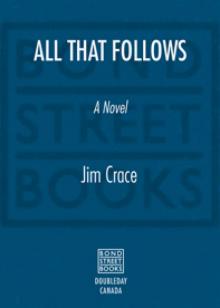 All That Follows
All That Follows Quarantine
Quarantine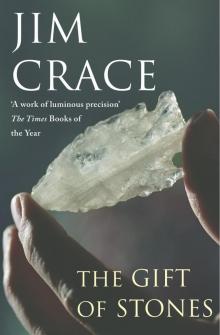 The Gift of Stones
The Gift of Stones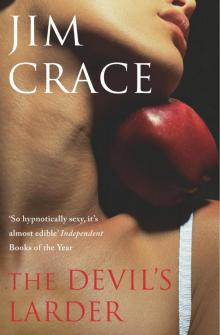 The Devil's Larder
The Devil's Larder Genesis
Genesis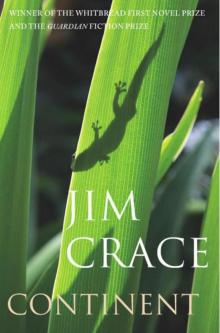 Continent
Continent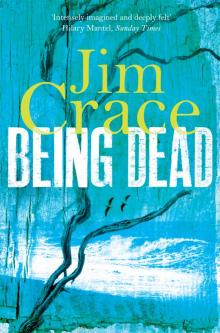 Being Dead
Being Dead Harvest
Harvest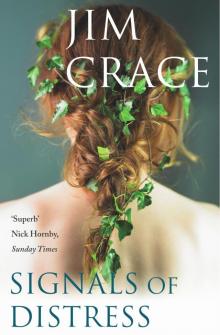 Signals of Distress
Signals of Distress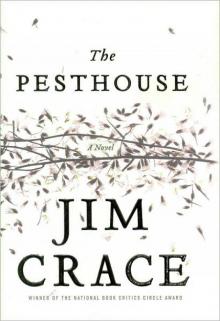 (2007) The Pesthouse
(2007) The Pesthouse